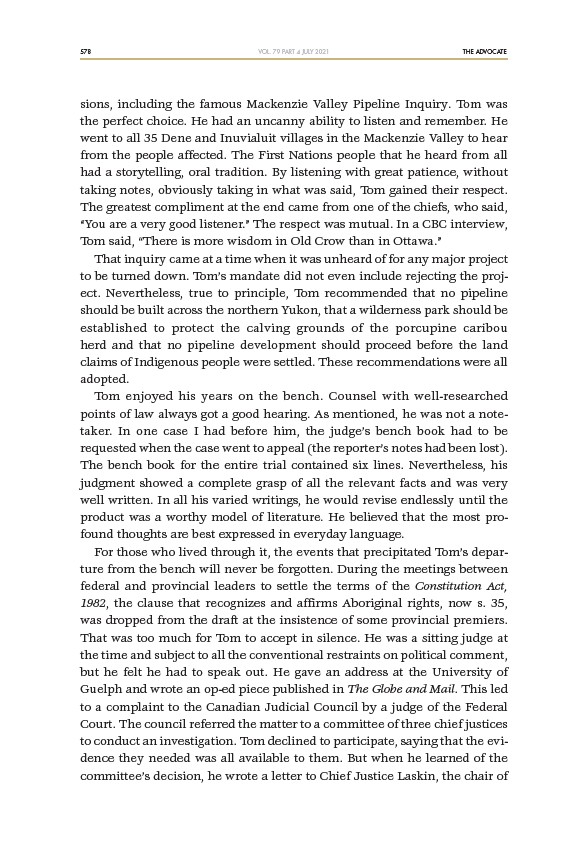
578 THE ADVOCATE
VOL. 79 PART 4 JULY 2021
sions, including the famous Mackenzie Valley Pipeline Inquiry. Tom was
the perfect choice. He had an uncanny ability to listen and remember. He
went to all 35 Dene and Inuvialuit villages in the Mackenzie Valley to hear
from the people affected. The First Nations people that he heard from all
had a storytelling, oral tradition. By listening with great patience, without
taking notes, obviously taking in what was said, Tom gained their respect.
The greatest compliment at the end came from one of the chiefs, who said,
“You are a very good listener.” The respect was mutual. In a CBC interview,
Tom said, “There is more wisdom in Old Crow than in Ottawa.”
That inquiry came at a time when it was unheard of for any major project
to be turned down. Tom’s mandate did not even include rejecting the project.
Nevertheless, true to principle, Tom recommended that no pipeline
should be built across the northern Yukon, that a wilderness park should be
established to protect the calving grounds of the porcupine caribou
herd and that no pipeline development should proceed before the land
claims of Indigenous people were settled. These recommendations were all
adopted.
Tom enjoyed his years on the bench. Counsel with well-researched
points of law always got a good hearing. As mentioned, he was not a notetaker.
In one case I had before him, the judge’s bench book had to be
requested when the case went to appeal (the reporter’s notes had been lost).
The bench book for the entire trial contained six lines. Nevertheless, his
judgment showed a complete grasp of all the relevant facts and was very
well written. In all his varied writings, he would revise endlessly until the
product was a worthy model of literature. He believed that the most profound
thoughts are best expressed in everyday language.
For those who lived through it, the events that precipitated Tom’s departure
from the bench will never be forgotten. During the meetings between
federal and provincial leaders to settle the terms of the Constitution Act,
1982, the clause that recognizes and affirms Aboriginal rights, now s. 35,
was dropped from the draft at the insistence of some provincial premiers.
That was too much for Tom to accept in silence. He was a sitting judge at
the time and subject to all the conventional restraints on political comment,
but he felt he had to speak out. He gave an address at the University of
Guelph and wrote an op-ed piece published in The Globe and Mail. This led
to a complaint to the Canadian Judicial Council by a judge of the Federal
Court. The council referred the matter to a committee of three chief justices
to conduct an investigation. Tom declined to participate, saying that the evidence
they needed was all available to them. But when he learned of the
committee’s decision, he wrote a letter to Chief Justice Laskin, the chair of